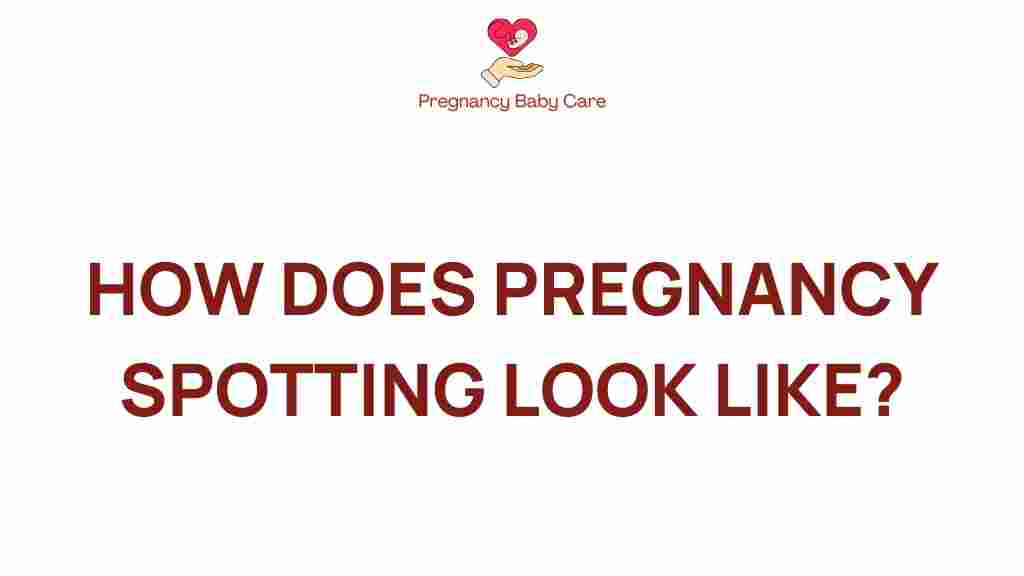Unraveling the Mystery: What Does Pregnancy Spotting Really Indicate?
Pregnancy is a time filled with excitement, anticipation, and a myriad of changes. Among these changes, many women experience various symptoms that can range from the joyful to the concerning. One such symptom that often raises questions is pregnancy spotting. For many women, understanding the nuances of spotting during pregnancy is crucial for their health and peace of mind. In this article, we will delve into what pregnancy spotting really indicates, its early signs, associated health concerns, and the importance of awareness in women’s health.
What is Pregnancy Spotting?
Pregnancy spotting refers to light bleeding that occurs during pregnancy. This can be alarming for many women, especially if they are unaware that spotting can be a normal occurrence. It is important to distinguish between spotting and a heavier flow of blood, which could indicate potential complications.
Early Signs of Pregnancy Spotting
Early in pregnancy, spotting may occur due to several reasons. Recognizing these early signs can help women better understand their bodies and respond appropriately:
- Implantation Bleeding: This occurs when a fertilized egg attaches itself to the lining of the uterus, usually around 6 to 12 days after conception. It is typically light pink or brown and lasts for a few hours to a few days.
- Hormonal Changes: Fluctuations in hormones during early pregnancy can lead to light spotting. This is often normal and not a cause for concern.
- Cervical Changes: The cervix becomes more sensitive and vascular during pregnancy, which can lead to light spotting, especially after intercourse or a pelvic exam.
When Spotting Could Indicate a Problem
While pregnancy spotting can be normal, it is essential to be aware of circumstances when it might indicate a health concern:
- Miscarriage: Heavy bleeding accompanied by cramping may be a sign of miscarriage. If you experience this symptom, it’s crucial to seek medical advice immediately.
- Ectopic Pregnancy: This occurs when the fertilized egg implants outside the uterus, often in a fallopian tube. Symptoms include sharp abdominal pain, dizziness, and heavy bleeding.
- Infection: Spotting can also be a sign of an infection in the reproductive tract. Other symptoms may include fever, unusual discharge, or pelvic pain.
- Placental Issues: Conditions such as placental abruption or placenta previa may lead to spotting, especially in the second and third trimesters.
Understanding the Color and Consistency of Spotting
The color and consistency of spotting can provide clues about its cause:
- Light Pink or Brown: Often associated with normal spotting or implantation bleeding.
- Bright Red: This could indicate a more serious issue, especially if it is accompanied by other symptoms like cramping.
- Clots: Passing clots along with bleeding should prompt immediate medical attention.
How to Approach Pregnancy Spotting
If you experience spotting during pregnancy, here are steps to take:
- Stay Calm: Remember that not all spotting is harmful. Many women experience spotting without any complications.
- Monitor Symptoms: Keep track of the color, amount, and duration of the spotting. Note any other symptoms such as pain or cramping.
- Consult Your Healthcare Provider: Always seek medical advice if you are concerned about spotting. Your healthcare provider can perform tests to determine the cause.
Seeking Medical Advice
It cannot be stressed enough that seeking medical advice is crucial when experiencing pregnancy spotting. Your healthcare provider can offer personalized insights based on your medical history and current symptoms. Here are a few questions you might consider asking during your consultation:
- Is my spotting normal for my stage of pregnancy?
- What should I monitor, and when should I seek further help?
- Are there any tests or examinations you recommend?
For more detailed information on women’s health, consider visiting this resource.
Tips for Maintaining Awareness of Your Health
Awareness of your body and its changes is vital for all women, especially during pregnancy. Here are some tips to help you stay informed:
- Educate Yourself: Read reputable sources about pregnancy and women’s health to better understand what to expect.
- Track Your Symptoms: Keeping a journal of your symptoms can help you spot patterns and communicate effectively with your healthcare provider.
- Join Support Groups: Connecting with other pregnant women can provide emotional support and shared experiences.
Common Misconceptions About Pregnancy Spotting
There are several myths surrounding pregnancy spotting that can lead to unnecessary worry:
- All Spotting is Bad: As mentioned, not all spotting is a sign of trouble. Many women spot without any complications.
- Spotting Equals Miscarriage: While spotting can be a sign of miscarriage, it is not definitive. Many women who spot go on to have healthy pregnancies.
- Only Heavy Bleeding is Concerning: Light spotting should not be dismissed. It’s essential to monitor any bleeding, regardless of the amount.
Conclusion
Understanding pregnancy spotting is crucial for any expectant mother. While it can often be a normal occurrence, being aware of the signs and symptoms is vital for maintaining good health. Always remember that if you have any concerns regarding bleeding during pregnancy, it’s important to consult with your healthcare provider for appropriate medical advice.
Stay informed, trust your instincts, and prioritize your health during this significant time in your life. By doing so, you empower yourself with knowledge and awareness in women’s health that can lead to a healthier pregnancy experience.
For more information on women’s health and related topics, consider checking out this external link.
This article is in the category Pregnancy and created by PregnancyBabyCare Team
